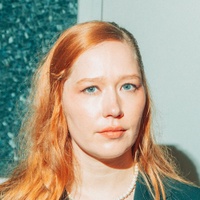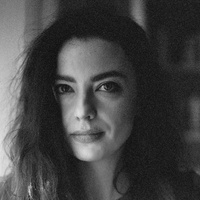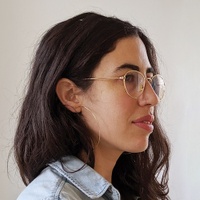As told to Jeffrey Silverstein, 2572 words.
Tags: Music, Success, Process, Beginnings, Day jobs, Mental health, Mentorship.
On protecting your definition of success
Musician Julia Jacklin discusses the ups and downs of making a living as an artist, being and feeling like yourself, and finding your people.Did music becoming your day-job change your relationship to it?
It’s an inevitability, if you’re lucky enough to do this for a living. Sometimes I get caught up feeling bummed out about losing this innocent connection to music that isn’t tied to my own ego or capitalism. If I go too far down that road, I have to pull myself back and be like, “Yeah, but you get to make a living off of it. So many people don’t get to do that.” It’s this constant seesaw of feeling incredibly nostalgic for when I first started music, how exciting it felt, and surprising yourself. I don’t surprise myself as much anymore, which is sad, but that’s because you’re getting used to what you’re doing and your standards keep rising.
I think about times when I would first write a song that was actually good and the feeling of elation that came from that. Now if I write a song that I think is good, the feeling is fleeting, which is a shame. I’m still in the stage of figuring out how to connect with being a music fan. Being three albums in, I still don’t fully feel like a full-time musician. I still struggle to think of this as being the all encompassing part of my life, which it has become.
What was your childhood vision of being a full-time musician?
It’s hard to shake my initial idea of what being a musician would feel and look like. I came up around lots of people who were technically gifted and pursuing music in this mathematical way. The classical singing world is highly regimented and has no room for individuality. It’s just following the rules, which I’m grateful for because it helped me gain real vocal strength. It helped me with touring, but was also a weird place to start my relationship with music. Most of my memories are getting in trouble. I don’t remember much of it being joyful, exciting, or encouraging.
I went from the classical music world into a small city music scene full of young people desperately trying to prove themselves. Part of that is tearing each other down, which I think is most people’s experience in small music scenes. Sometimes I talk to people who came up in really encouraging scenes like, “Wow. That sounds nice.”
How has your definition of success changed over the years?
I didn’t expect to become a full-time musician in a real way because you can’t be “in” what you can’t see in terms of my scene and family. I’m not talking about representation, but in my world. I didn’t know anyone who did music full-time. I didn’t have that context or know how it worked. You don’t understand who is in the industry and have these movie ideas where you just need some guy in a suit to be in the back of the room. It’s like, “Is that how it happens?” For most people and for me, it was a very slow, tiny thing after tiny thing accumulating over time.
I remember getting a manager and him saying, “I’m going to start shopping this around to labels.” I was like, “Oh. I’m going to get signed to a label? Is that the plan?” He was like, “Obviously. That’s the plan.” I was like, “Oh, okay. Wow. That’s crazy.” One of the hardest things once you cross over into the world I’m in is trying to retain your own definition of success when so many people around you are feeding you their definition bit by bit. If you’re not careful, it’s going to chip away at your definition of success until it’s completely replaced by theirs.
I’d imagine their messaging gets louder and more frequent.
I’ve had multiple points in my career where I felt successful, proud of myself, and then it’s swiftly undercut by, “All right. Well next time.” I played this sold out show in London and to me, that was huge. I can’t remember what venue it was, but there were 1,000 people there. It was a great show. I walked off stage and felt so at peace in my heart and soul, elated. I remember getting into the green room and there were people from my label. The conversation went straight to, “Well next time you come back to London, we’re going to get you into this next venue, which is two and a half thousand capacity.” There’s all these people in the green room I didn’t know, with champagne glasses. It was so cliché just being like, “Yeah. Onwards and upwards.”
I felt defeated and sad in that moment, it’s interesting how that happens so often. You have to try and grab onto moments where you feel successful with both hands and try not to let them go because there’s always something else you could be doing. For this album campaign, I love the record and decided to tour it, but am feeling the pressure of, “Okay. Let’s take this to the next level.” All of that feels separate to the music and to what makes me feel good.
What even is the “next level”?
I sometimes look people dead in the eye and am like, “I’m an indie singer songwriter. This is the pinnacle of success for me. What are you talking about? Just please. Tell me what you mean by the next level of success. I don’t think you know.” We’re not used to being content because it’s a business. I understand that, so I’m not pushing against it in this ignorant way. I understand that everybody on the team is making money off the work, that there are financial incentives. I respect that, but sometimes when it’s just this constant ‘next level.’ “What does that look like?” I’m not going to become a pop star. What is the next level?
What about your connection with touring?
I tour a lot for an Australian artist. Musicians kind of think, “Is Julia Jacklin okay?” They see my touring schedule be like, “Is she all right?” A lot of the time the answer would be not really. I toured a lot in the beginning because I kind of did whatever was asked of me. I didn’t really feel like I had a choice, and also didn’t know what touring was like yet. You’re only young once, etc. I’m just going to do it all. When it came to Crushing I thought, “I’m going to be better this time. I’m going to have more boundaries.” It’s not just the touring, you also have to fit in radio sessions and press stuff.
I was so depressed and tired when I filmed my KEXP session. I had this breakdown a couple of days before. That was the first time I had a panic attack on stage in Chicago, and was just so exhausted. I lost sense of myself in a hard to describe way. I remember being at KEXP and being like, “I should not be on camera right now.” Then I looked back at the session and I’m like, “Wow. It’s good. You’ve managed to do that,” which is good, but also scary because you realize how good you get at masking how you’re feeling. I was saying, “I’m going to be better,” but I wasn’t. I said yes to everything again, and I toured forever.
Because I live in Australia, a lot of the time you’re away for huge chunks of time because it’s too expensive and exhausting to fly back if you have a week or two weeks off. You end up being away for five months at a time compared to North America, where you would go away for a month and then go home.
I love playing shows. That’s the part of the job that I do really like, but towards the end of the last tour it hit home how there could be long term consequences if you’re not careful. I was very, “No. Totally ruin yourself now and then you can just recover later.” I think that level of touring permanently damaged me in terms of panic attacks. I’ve never had that before and they’re with me forever. I don’t think I respected my brain enough when I was touring that much whereas now, I’m a bit more like, “You have to look after yourself if you want to do this long term.”
You put a lot of pressure on yourself regarding stage banter. Not a lot of artists talk about how hard the in-between moments on stage can be.
That’s such a tough one. Sometimes I feel that if I don’t make the audience laugh two to three times in a set, then the show has kind of failed. Then I’m like, “Wait, I’m not a comedian. Why do you put so much value on making people laugh over just playing the music they paid to see?” There’s this weird pressure to be a show person because you’re up there for over an hour. Especially with my kind of music where I don’t have a mysterious, artsy persona where you can hide within a character, which I envy to be honest. I’m just not like that as a person. It would be inauthentic and I would find it impossible to pretend to be a closed book.
You have to be yourself, which is the most cliché shit you’ve ever heard, but it’s true. You have to feel like yourself. That can be creating a character if that’s what you need to do. When I watch younger people performing, I recognize that feeling when a song ends and you’re tuning your guitar and trying to fill that space with nervous energy. Saying stuff that you know is going to make the audience laugh. Sometimes people are saying not much at all, but the audience is primed to laugh at awkwardness. We’re doing a disservice to ourselves and our art by feeling we have to fill in those silences to keep the audience engaged.
It’s so much nicer for me personally and for my audience if I finish a song just to trust that they have me and I have them. That they are there to watch a professional, and I want them to feel comfortable, relaxed. That can come from peaceful silence, taking a breath, and not feeling that intense compulsion to jump in and fill the silence. I’ve tried to trust that we have each other’s backs in the moment. I don’t need to guide them through every second of the show.
Someone who I learned a lot from is Aldous Harding. She’s so commanding of the space, and is creating a world, not breaking it between every song in order to make the audience feel comfortable. That creates a better show. She’s taking herself seriously. She’s not breaking the spell that she’s casting. You walk out of her show feeling you’ve just slipped into some world for a second. That’s what a show should be.
An important moment came when your audience began skewing younger. When did this happen?
It happened with my second record. My first record was a shared experience of being a slightly hyped debut in the indie rock world where you get crowds skewing to cis older men with their arms crossed. Just seeing if you’re worth their scene and whatnot. People who are coming more from a place of, “Let’s see what she’s got.”
With Crushing I noticed the crowd suddenly was quite younger. It was the best thing in the world because that’s who I was writing for. Initially you’re like, “I don’t feel my music is reaching the people I wanted to reach.” When that changed, I was like, “Oh, thank god. This is who I hoped would hear this music and know that they get it.” The next part, which is even greater, is children and their parents both liking me. I’ve had that a lot lately. Young kids will message me and be like, “Me and my dad/mom love your music so much.” That is the best because parent-child relationships are so difficult especially when you’re a teenager. If I can help in any way, even if there’s just one through line for you guys, I’d be happy if that was my whole legacy. It’s an interesting experience to see your crowd transform in time especially in a way that you hoped for.
The music industry is geared towards younger people. Is ‘’having all the time in the world” a myth?
I find it funny when people say to me like, “Oh, you’ve got all the time in the world.” They’re like, “You’re going to have a long career.” I’m, like, “Can you write me a list of how many indie rock women over the age of 40 are respected, relevant? Before you say that to me, I need you to do some thinking.” Obviously that’s the dream. It is hard to look up and be like, “Well, I don’t see heaps of examples that I’m supposed to be feeling encouraged by,” especially in Australia. It is dire in Australia. I have some fanciful idea of Europe being a little less ageist, but Australia is shocking when it comes to it. That’s why I have put a lot of energy and effort into an overseas career. I know that here it would be virtually impossible. Sometimes I get annoyed when people say that to me because I’m like, “What world do you live in? I don’t know what you’re talking about.” There are some women I look up to who are still doing it.
I think about it a lot and wish I didn’t. When I was younger, I would have just been like, “Shut up,” but when you are older, it just kind of happens.I didn’t start to know what I wanted to do with music until I was 25. I didn’t feel very supported or encouraged when I was younger. It took me a long time to figure out who were the people I should not collaborate with, and how to start a band without feeling stepped on.
I came up in a scene with guys pretending they were from the 1920s, singing songs about the Virginia railroads or something in Sydney. It was horrible. Unfortunately that was my introduction to folk music, not a particularly inspiring time. It took me a while to find my place, my people, and find spaces that wanted me to succeed. These spaces are quite difficult to find. Once you find it, you’re like, “Fuck. I’ve lost so much time.”
I’m still processing that and surrounding myself with older women including Courtney Barnett. Your whole life is finding your people. You lose some, you gain some. Finding people who affirm you and make you feel like you belong, like your work is valued even if you’re, god forbid, 35 or something.
Julia Jacklin Recommends:
Archie Roach - Charcoal Lane (album)
Sally Field - In Pieces (book)
Patrizia Cavalli - My poems won’t change the world - Selected Poems
Looking for Alibrandi (film)
Tina Turner - “Why Must We Wait Until Tonight” (song)




